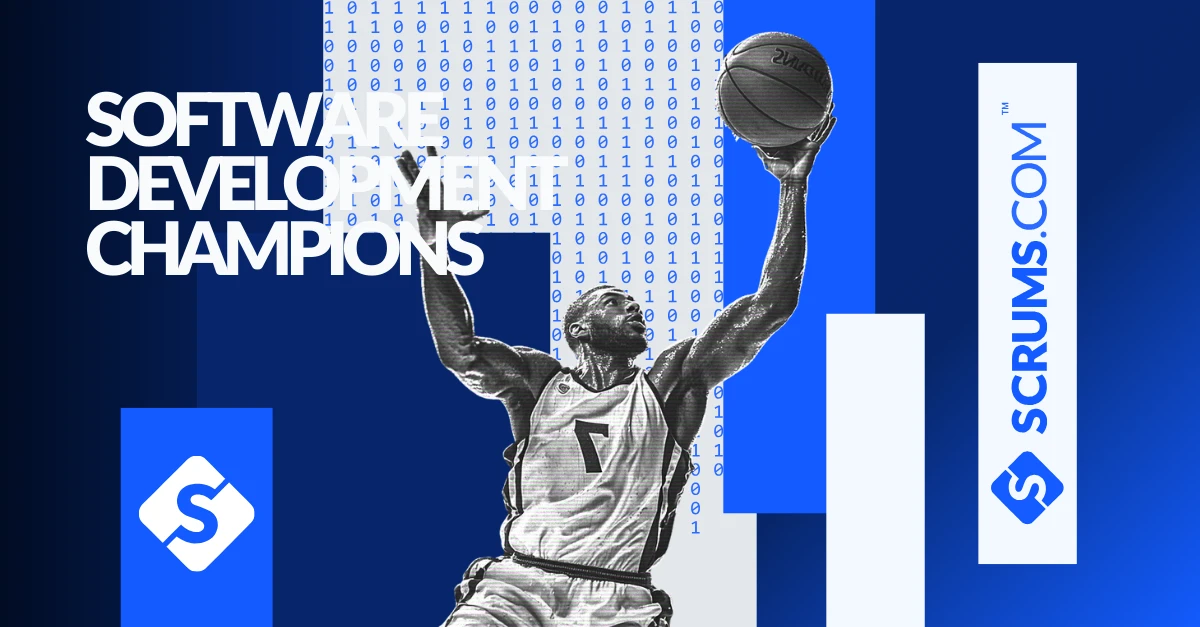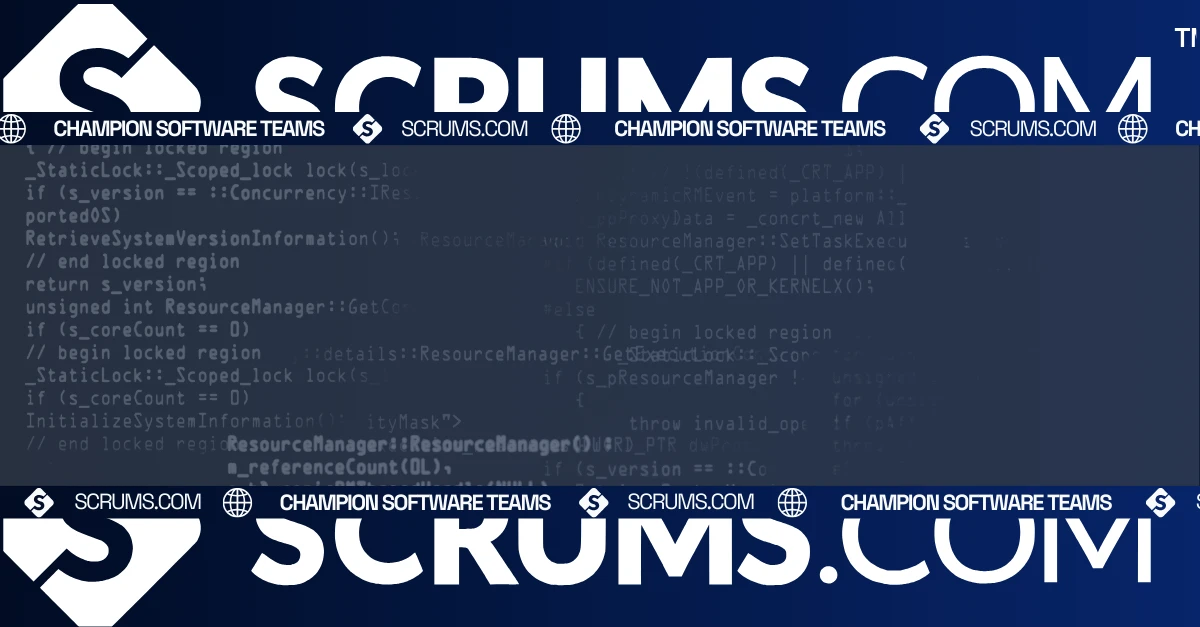Hire SQL software developers
Scrums.com's 10,000+ software developer talent pool includes experts across a wide array of software development languages and technologies giving your business the ability to hire in as little as 21-days.







































Years of Service
Client Renewal Rate
Vetted Developers
Ave. Onboarding
Africa Advantage
Access world-class developers at 40-60% cost savings without compromising quality. Our 10,000+ talent pool across Africa delivers enterprise-grade engineering with timezone overlap for US, UK, and EMEA markets.
AI-Enabled Teams
Every developer works within our AI-powered SEOP ecosystem, delivering 30-40% higher velocity than traditional teams. Our AI Agent Gateway provides automated QA, code reviews, and delivery insights.
Platform-First Delivery
Get real-time development visibility into every sprint through our Software Engineering Orchestration Platform (SEOP). Track velocity, blockers, and delivery health with executive dashboards.
Align
Tell us your needs
Book a free consultation to discuss your project requirements, technical stack, and team culture.
Review
We match talent to your culture
Our team identifies pre-vetted developers who match your technical needs and team culture.
Meet
Interview your developers
Meet your matched developers through video interviews. Assess technical skills and cultural fit.
Kick-Off
Start within 21 days
Developers onboard to SEOP platform and integrate with your tools. Your first sprint begins.
Don't Just Take Our Word for It
Hear from some of our amazing customers who are building with Scrums.com Teams.
Flexible Hiring Options for Every Need
Whether you need to fill developer skill gaps, scale a full development team, or outsource delivery entirely, we have a model that fits.
Augment Your Team
Embed individual developers or small specialist teams into your existing organization. You manage the work, we provide the talent.
Dedicated Team
Get a complete, self-managed team including developers, QA, and project management – all orchestrated through our SEOP platform.
Product Development
From discovery to deployment, we build your entire product. Outcome-focused delivery with design, development, testing, and deployment included.
Access Talent Through The Scrums.com Platform
When you sign-up to Scrums.com, you gain access to our Software Engineering Orchestration Platform (SEOP), the foundation for all talent hiring services.
View developer profiles, CVs, and portfolios in real-time
Activate Staff Augmentation or Dedicated Teams directly through your workspace

Need Software Developers Fast?
Deploy vetted developers in 21 days.
Tell us your needs and we'll match you with the right talent.
What is SQL and Why It Matters for Your Business
SQL (Structured Query Language) is the standard programming language used for managing and manipulating relational databases. SQL is crucial for handling large volumes of data, making it a backbone technology for many enterprise systems, data management applications, and analytics platforms. According to a 2023 Stack Overflow Developer Survey, SQL ranks as one of the most commonly used languages, with over 54% of developers using it regularly.
For businesses that rely on data-driven decision-making, hiring an SQL developer is essential. These experts ensure that your databases are optimized, secure, and scalable, allowing you to harness the full potential of your data.
Key Benefits of Hiring an SQL Developer
Hiring an SQL developer offers several significant benefits, especially for businesses that manage large amounts of data. Here are some key advantages:
- Efficient Data Management: SQL developers are skilled in creating and maintaining databases that handle vast amounts of data efficiently. This is crucial for businesses that need to store, retrieve, and analyze data quickly and accurately.
- Custom Database Solutions: An SQL developer can design and implement custom database solutions tailored to your specific business needs. Whether it’s a CRM system, inventory management, or financial reporting, a well-designed SQL database ensures that your operations run smoothly.
- Data Security and Compliance: SQL developers implement robust security measures to protect sensitive data. With increasing concerns about data breaches and privacy regulations, having a secure database is vital for maintaining compliance and protecting your business’s reputation.
- Scalability and Performance: SQL developers optimize databases to ensure they can scale with your business. As your data grows, a well-optimized SQL database will maintain high performance, preventing slowdowns and ensuring that your applications remain responsive.
- Integration with Other Technologies: SQL is compatible with a wide range of applications, from web development frameworks to data analysis tools. An SQL developer can integrate your database with other technologies, enabling seamless data flow across your systems.
Core Competencies of a Skilled SQL Developer
When hiring an SQL developer, it’s essential to ensure they possess the necessary skills and expertise to deliver high-quality database solutions. Key competencies include:
- Proficiency in SQL and Database Management: A skilled SQL developer should have a deep understanding of SQL syntax, queries, and best practices. This includes experience with major relational database management systems (RDBMS) such as MySQL, PostgreSQL, Microsoft SQL Server, and Oracle.
- Experience with Database Design and Optimization: An expert SQL developer should be proficient in designing efficient database schemas, normalizing data, and optimizing queries to improve performance. This ensures that your database runs efficiently, even under heavy load.
- Knowledge of Data Security Practices: A good SQL developer should be well-versed in implementing security measures such as encryption, access controls, and secure authentication. This is critical for protecting sensitive data and maintaining compliance with industry regulations.
- Understanding of Data Warehousing and ETL Processes: For businesses that handle large volumes of data, an SQL developer with experience in data warehousing and ETL (Extract, Transform, Load) processes can design systems that facilitate data integration and reporting.
- Problem-Solving and Analytical Skills: A skilled SQL developer should have strong problem-solving abilities and be capable of analyzing data to identify trends, optimize performance, and troubleshoot issues. This ensures that your database remains robust and reliable.
How SQL is Used in Modern Data Management
SQL plays a central role in modern data management, powering everything from small business databases to large enterprise systems. Here are some common uses:
- Enterprise Database Solutions: SQL is the foundation of many enterprise database systems, enabling businesses to store and manage large volumes of data across multiple departments. SQL databases support critical business functions such as finance, operations, and customer management.
- Custom Databases for Web Applications: Many web applications rely on SQL databases to manage user data, content, and transactions. SQL developers work with frameworks like Laravel, Django, and Ruby on Rails to integrate databases into web applications seamlessly.
- Data Warehousing and Business Intelligence: SQL is widely used in data warehousing and business intelligence (BI) to aggregate data from various sources, enabling businesses to generate insights and make data-driven decisions. SQL developers design and manage these complex systems to ensure data accuracy and availability.
- E-commerce and Transaction Management: E-commerce platforms depend on SQL databases to manage product catalogs, customer information, and transactions. SQL developers optimize these databases to handle high traffic volumes and ensure data consistency.
- Reporting and Analytics: SQL is integral to generating reports and performing analytics. SQL developers create complex queries to extract meaningful insights from data, supporting business strategies and decision-making.
SQL vs. Other Database Technologies: When to Choose SQL for Your Project
Choosing the right database technology is critical to the success of your data management project. Here’s how SQL compares to other technologies and when it might be the best choice:
- Structured Data Management: If your project involves managing structured data with clear relationships, SQL’s relational database model is ideal. SQL provides powerful querying capabilities and ensures data integrity through ACID (Atomicity, Consistency, Isolation, Durability) properties.
- Scalability for Large Data Volumes: SQL databases are highly scalable, making them suitable for large-scale applications. Technologies like MySQL and PostgreSQL offer clustering and replication features that enable your database to scale horizontally, ensuring consistent performance.
- Wide Industry Adoption: SQL is a mature technology with widespread adoption across various industries, from finance to healthcare. This makes it easier to find skilled SQL developers and ensures strong community support and ongoing development.
- Security and Compliance: For businesses handling sensitive data, SQL databases offer robust security features and compliance tools. Compared to NoSQL databases, SQL provides better support for complex security requirements and regulatory compliance.
- Complex Queries and Reporting: SQL’s advanced querying capabilities make it the best choice for applications that require complex data analysis and reporting. If your project involves generating detailed reports or performing in-depth analytics, SQL is likely the better option over NoSQL technologies.
The Future of SQL Development: Trends and Insights
SQL continues to evolve, remaining a key technology in data management and analytics. Here are some trends and insights into the future of SQL development:
- Growth of Cloud-Based SQL Solutions: As more businesses move their databases to the cloud, SQL is adapting to this trend with services like Amazon RDS, Google Cloud SQL, and Azure SQL Database. These platforms offer scalability, security, and flexibility, making SQL an even more attractive option for modern businesses.
- Integration with Big Data Technologies: SQL is increasingly being integrated with big data technologies like Apache Hadoop and Apache Spark. This allows businesses to leverage SQL’s querying capabilities for big data analytics, combining the strengths of both relational and big data platforms.
- Focus on Data Security and Privacy: With growing concerns about data breaches and privacy regulations, SQL development is placing a stronger emphasis on security. SQL developers are adopting best practices for encryption, access control, and auditing to ensure compliance with regulations like GDPR and CCPA.
- Advancements in SQL Performance Optimization: As data volumes continue to grow, SQL developers are focusing on performance optimization techniques such as indexing, partitioning, and query optimization. These advancements ensure that SQL databases can handle increasingly complex workloads without sacrificing performance.
- Increased Use of Automation and AI: SQL developers are beginning to leverage automation tools and artificial intelligence to streamline database management tasks. These tools can automate routine tasks like indexing and backups, allowing developers to focus on higher-level optimization and strategy.
How to Hire the Right SQL Developer for Your Needs
Finding the right SQL developer is crucial to the success of your data management project. Here’s how to get started:
- Define Your Project Requirements: Clearly outline your project’s scope, technical requirements, and desired outcomes. This will help you identify developers with the right skills and experience.
- Look for Relevant Experience: Choose developers with a proven track record in SQL development, particularly those who have successfully completed projects similar to yours. Experience with database design, optimization, and security is essential.
- Evaluate Technical Skills: Ensure the developer has strong SQL coding skills, experience with major RDBMS platforms, and proficiency in database design and optimization techniques.
- Assess Communication and Collaboration: Effective communication is key to a successful project. Your SQL developer should be able to articulate ideas clearly and collaborate effectively with your team.
- Consider Freelancers or Development Agencies: Depending on the scale of your project, you may opt to hire a freelance developer or work with a development agency specializing in SQL. Each option has its advantages, so choose based on your project’s needs and budget.
Find Related Software Developer Technologies
Java Developers
Javascript Developers
Swift developers
React Native Developers
C++ developers
Python Developers
PHP Developers
.NET Core developers
Explore Software Development Blogs
The most recent trends and insights to expand your software development knowledge.
















